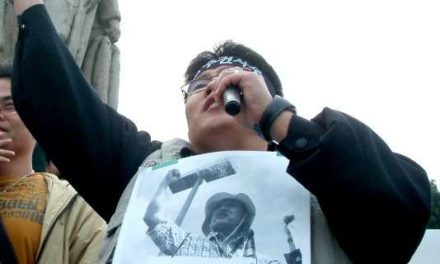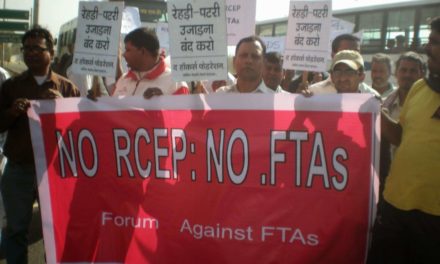Japanese participants against WTO in Hong Kong Oppose "Support Package for Developing Countries"provided by the Japanese government at the sixth WTO Ministerial Conference.
The Japanese Foreign Minister, Taro Aso said in a statement expressing three policies at the WTO Ministerial Conference on Dec. 14, 2005
-
contributing 10 billion US dollars for infrastructure building,- conducting exchange of experts and trainees (if translated from Japanese directly, it means sending Japanese experts to developing countries and accepting trainees from them), amounting to ten thousand people, and
We never consider that such proposal represents what the Japanese government provided to try to clear up poverty in developing countries with a will. Actually, the Support Package of the Japanese government may definitely result in expanding poverty in developing countries, attaining the interests of Japan itself or transnational corporations through the process of the WTO. Above all, the export-oriented agriculture promoted under the Package will seek higher efficiency of agricultural productivity; consequently, accelerating such transformation of agriculture as may require use of chemical fertilizers, hinge on agricultural mechanization, strengthen single product production, or the like, and finally culminating in the destruction of the natural environment. Therefore, we strongly oppose the above proposal of the Japanese government due to the following reasons;
1.Why is the contribution of 10 billion US dollars problematic?
a) The contribution of 10 billion US dollars is not a new initiative,but just a replacement for the total money amounting to the fund which has been donated within the current framework of the ODA program by the Japanese government plus some more, taking an opportunity of the WTO conference. Hence, the proposal is no more than rhetoric for seducing developing countries to hang on the Japanese policies at the WTO negotiation.
b) Originally, the country takes a basic policy of ODA programs based on or aimed at national interests or security. We must consider that the contribution of 10 billion US dollars is what was proposed within the framework by the Japanese government.
c) Almost all of existing foreign aid of the Japanese government has supported foreign investment of Japanese firms by way of developing countries. As the 10 billion US dollars’ contribution is directed toward infrastructure buildings only(among them, trade-related support), the money funneled into developing countries in the name of donation will be, definitely and in the end, returned to Japan or developed countries through TNIs’ acceptance of order for infrastructure buildings. As a result, people in developing countries may be deprived of the possibility that they could build infrastructure in their community for their own sake and for themselves.
2. Why is the exchange of experts and trainees problematic?
a) Although the Japanese government has declared acceptance of trainees, in fact, under what legal framework the country will accept them is quite unclear or the current immigration law doesn’t describe any residence status possibly required of such trainees. From this point of view, we criticize the Japanese government for no sense of responsibility.
b) Otherwise, if the government accepts trainees under the current Trainee Program where they are sent to private companies, they may be forced to work as a cheap and disposable laborer with a fixed-term employment contract deprived of worker’s rights, which is currently at issue.
c)However, it is pointed out that trainees could not get enough training owing to short stay in Japan, if the government were to accept them under the current legal system.
d) In addition, we see many cases where the Japanese government sends experts to developing countries without paying any attention to the needs of developing counties.
3. Why is the duty-free and quota-free market access problematic?
a) The Japanese policy of duty-free and quota-free market access drives developing countries into an export-oriented industry. It will destroy basic production required for survival of people in developing countries and threaten food sovereignty on which people there could live at ease on.
b) On the other hand, the duty-free and quota-free market access will deteriorate the food self-efficiency rate in Japan which are already down to 40 percent, and the access may deliver a blow to Japanese agriculture, which is quite inconsistent with the existing stance of the Japanese government on the WTO negotiation.
Signed by participants in Hong Kong People’s Action Week:
(in the order of the Japanese syllable, as of Dec 15, 2005)Organizations:
ATTAC Japan
Asia-Japan Women’s Resource Center
Ajia Noumin Kouryou Senta[Asian Farmers Exchange Center]
altermonde
The network of Hokkaido for knowing the past and the present
Kansai Kyoudou Koudou[Cooperative Action in Kansai]
Kyodo Senta – Rodo Joho[Co-operative Center-Labor Information]
Sapporo Jiyu Gakko [Free School Sapporo]
Shimin Jichi wo Tsukurukai [Association for Making Civil Governance]
Jubilee Kansai Network
Jinmin no Chikarqa[Power of People]
Seikatsu Kyoudou Kumiai Esukoopu Osaka[Consumers Co-operative Escoop Osaka]
Sensou heno Michi wo Yusrusanai Onnatachi no Kai[Association for Women against the way to War]
No to WTO Grassroots Campaign in Japan
Consumers Union of Japan
Japan Committee for Negros Campaign
People’s Plan Study Group
Privacy Action Sapporo
Hokkaido Pisu Netto[Hokkaido Peace Network]
Individuals:
ANDO Takemasa, student
ICHIMURA Tadafumi, Forum for Peace, Human Rights
and Environment
INOUE Reiko, Pacific Asia Resource Center (PARC)
IKEDA Minoru, Postal Worker
UMEDA Satoshi, GDU-Osaka
OHNO Kazuoki, Asian Farmers Exchange Center
OCHIAI Jiroh, Zennichno
OYA Sadaharu, People’s Plan Study Group
KANAME Yukiko, Sexwork and Sexual Health(SWASH)
KAWAZOE Makoto, Labor Net Japan
KURIHARA Yasushi, ATTAC Japan
GUNJI Hiroshi, Japan Asia Africa Latin America Solidarity
Committee
KOSHIDA Kiyokazu, Policy Research Institute for the Civil
Sector
KOBAYASHI Kazuo, JAPAN COMMITTEE on NEGROS
CAMPAIGN
SAITOH Kohichi, Aomori Farmers Union of Japan
SHIBATA Haruna, Cooperation and Future
SHIMIZU Ryoko, Policy Research Institute for the Civil Sector
SUETO Haruyoshi, Hokkaido Farmers Union of Japan
TAKIMOTO Shohei, Jubilee Kyushu on World Debt and
Poverty
NAKATA Norihito, ATTAC Japan
FUJIMURA Yasuko, Seikatsu Club Consumers’ Co-operative
FUJIMORI Hiroyoshi, Zennichino, Tottori
MASHIMA Yoshitaka, Japan Family Farmers Movement
MOCHIZUKI Yoshiharu, ATTAC Japan
YAMADA Fujio, Hokkaido Farmers Union of Japan
YASUDA Yukihiro, Labor Net Japan
YAMAURA Yasuaki, Consumers’ Union of Japan
YORIDA Yukio , The Article 9 Association
YOSHIDA Makiko, Agri-Project in Kyushu (ApiQ!!JAPAN)
WATARIDA Masahiro, Globalization Watch Monitor
Hiroshima
Contact:
Toshi Ogura, People’s Plan Study Group
+81-90-6496-8049
[email protected]
[email protected]
Yoko Akimoto, ATTAC Japan
+81-90-9824-9081
[email protected]








